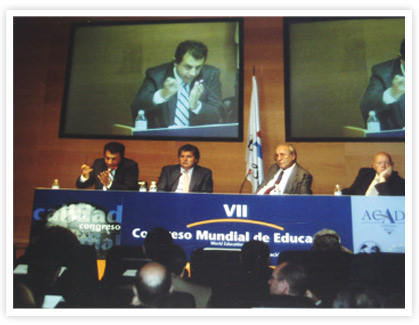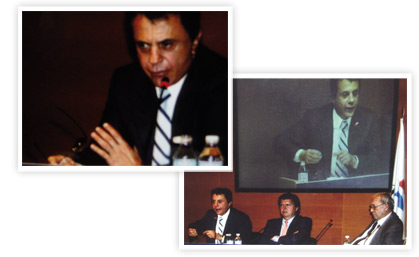| World Confederation of Education - COMED |
| Madrid, Spain - 2004 |
HISTORICAL ABSTRACT
VII WORLD CONGRESS ON EDUCATION (2004)
"Educational Excellence"

DR. EDGARDO DE VINCENZI LECTURING TOGETHER WITH AL DR. ALVARO FERNÁNDEZ MARTÍNEZ AND OTHER LECTURERS DURING THE CONGRESS HELD AT THE CONVENTION CENTER IN MADRID.
CONCLUSIONS OF THE CONGRESS
The Spanish Private Education Organization ACADE, the European one CADEICE and the World organization COMED have just held the IV European and VII World Congress of Education in Madrid, under the motto “Educational Excellence.”
Such Institutions represent over 200 organizations and associations which are made up of 75.000 centers where over 28 million students are educated every year. If we consider their families, over 100 million people choose these centers. These citizens are the best social backup and the main objective in our Congress.
Many professionals have taken part in the Congress, such as education authorities, guild organizations, the media, professors, students and parents. And this time, due to its special theme, major experts in the field.
As a result of the debates and reflexions about the challenge Educational Excellence presents today, States, Governments, Educational Centers, ACADE, CADEICE and COMED have reached the following conclusions:
1. Due to the special role Education has in the personal development and social progress of people's lives in this third millennium, we reiterate to the Highest National and International Authorities that it should be considered a main objective in their political affairs.
2. In our democratic world, educational pluralism is utterly indispensable. Therefore, the antagonisms of the public, the private and subsidized systems and the private and not subsidized ones should be finally overcome because this pluralism is the best guarantee of educational competition in each part.
3. In order to get to this, the politicians responsible for education can no longer be content with passive and permissive attitudes. They have the obligation to promote and support free school attendance to any of the systems, considering students as the true motivation for excellence and progress. Such competition is the key factor for permanent improvement in any school system.
4. "Educational Excellence" is, undoubtedly, the main demand of new societies in the XXI century; citizens consider the "right of education" as surpassed by the “educational rights,” a true body of rights connected to education.
5. Education is no longer a mere right, but the instrument though which mankind can gain any type of right since, without a pluralistic, competitive and excellent education, access to rights or liberties is compromised.
6. The inequality of real opportunities for citizens who choose a private model of education without any or a poor kind of financing is undoubtedly the most urgent of the problems to be sorted out in order to reach Excellence; without equality of opportunities there is no justice, liberty, democratic pluralism, progress or excellence at all.
7. We reiterate that States have the obligation to finance educational centers through direct, sufficient and adequate subsidizing in order to: make educational rights, teach freely and with equality of opportunities when possible; assure that all citizens can freely choose the school system they desire without being discriminated against as a part of a disloyal campaign.
8. We consider particularly unfair and discriminatory the fact that in this current democratic and pluralistic world, those responsible for education barely help financing those families which choose the Educational Excellence of private education when they are already paying for the schooling system through their taxes.
In order to solve this unjust and discriminatory situation, which had already been pointed out by the General Director of the European Commission of Education during the First European Forum of Education and Liberty, it is indispensable to find the way to finance those families through cheque or school bonus or through fiscal release of educational expenses in taxes or in any other possible way.
9. We recommend the progressive implementation of Quality Systems in Educational Centers as an element of efficiency in the achievement of Excellence.
10. We request from the UN to create an International Fund of Educational Charity with the contribution of developed countries, which should be destined to improve the Educational Quality of those countries which are still underdeveloped.
Madrid, April 28th., 29th., and 30th., 2004.

• Jesús Núñez
• Alvaro Fernández
• Edgardo De Vincenzi
• Õñigo Méndez de Vigo
• Stephen Murgatroyd
• Geraldine Keegan
• Alvaro Marchesi
• Manuel Frérriz
• Carles Picó
• Fernando GonzálezFerreras
• Eduardo Moreno Ortega
• Manuel Antonio Rocha
• Howard Gardner
• John de Zulueta
• Jaime Lloret
• Joaquín Membrado
• Jorge Marín
• Sergio Smichdt
• Paulo Roberto Meurer
• Eduardo Montes
• Javier Alomar
• Gonzalo Hinojosa
• Angel Saenz de Cenzano
• Michael Barber
• Perpetuo Lentijo
• Luis Peral